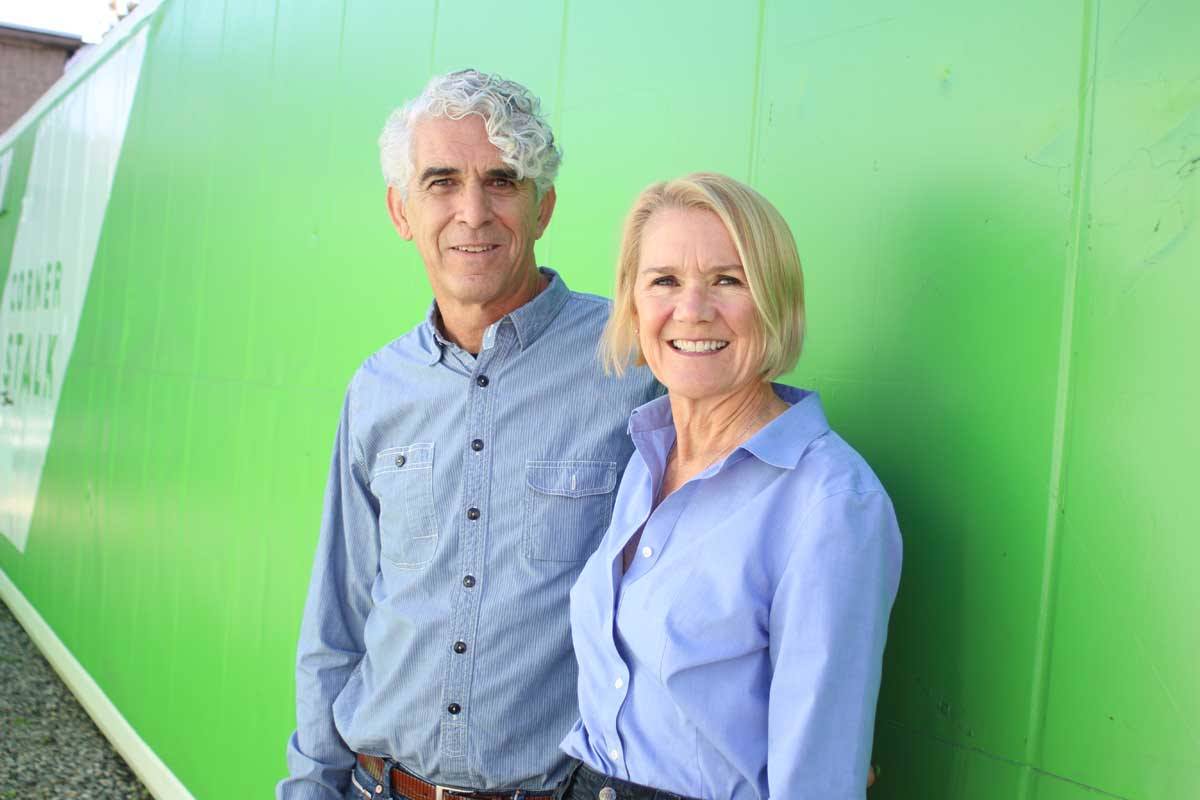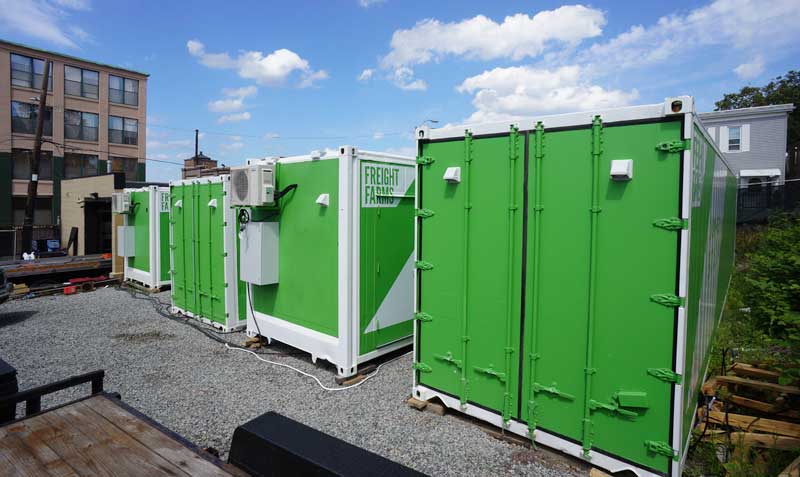Meet a Baby-Boomer Couple Farming in Shipping Containers
Urban farming is as hip as it gets. But it just got hipper – and more profitable.
Meet a Baby-Boomer Couple Farming in Shipping Containers
Urban farming is as hip as it gets. But it just got hipper – and more profitable.

The company’s Leafy Green Machine, as they call their upcycled 40-foot shipping containers, comes with its own computerized brain that allows you to monitor the temperature, moisture, humidity, and nutrient levels of the hydroponic system remotely with a smartphone. Pink-hued LED light strips hang in front of each of the vertical grow towers, giving a party vibe to the whole operation. Bluetooth-connected speakers embedded in the ceiling make it easy to rock out to your favorite playlist while you work. Aesthetically, it’s a highly curated experience: equal parts Apple-inspired and post-industrial chic.
We wrote about Freight Farms back in 2013, and we wanted to follow up with farmers actually using the equipment. Despite the epic hipness of the marketing campaign, some of the first farmers to set up shop are a couple of down-to-earth Baby Boomers, Shawn and Connie Cooney of Cornerstalk Farm. A retired software developer and school teacher, respectively, the Cooneys show that the farm-in-a-box concept is not only cool, but practical. Shawn Cooney started, developed, and sold three different software companies in his career and then decided to buy four of the Leafy Green Machines in 2013 because he saw their entrepreneurial potential. In an area of 320 square feet – the equivalent of 10 standard size 4′ by 8′ vegetable beds – the Cooneys grow about 7,000 head of lettuce at a time, of which 500 or so are harvested each week. While other farms in the Boston area harvest vegetables mainly from June to October, Cornerstalk’s climate-controlled environment allows for year-round harvest.

“As a business plan it made sense, so we went ahead with it,” says Shawn. The Cooneys settled in a tow truck company parking lot in East Boston, and within two months were starting to harvest and sell produce to restaurants and wholesalers. After the initial learning curve, they make around $15,000 per month from the four shipping containers, which Cooney says is enough to cover all of their overhead expenses – electricity, seed, nutrients, rent to the tow truck company, and loan payments on the shipping containers – plus a salary, “which is modest by any stretch of the imagination,” he says.
The Cooneys finagled a low-interest loan from the USDA to buy their shipping containers, through the agency’s farm equipment financing program. The program, which normally helps to finance tractor purchases and feed mill equipment, had never given a loan for anything like Cornerstalk’s Leafy Green Machines (LGMs), but Cooney says he “found the person in charge of the Boston area [at the USDA] and worked with him to vet and underwrite the freight farm units as farm equipment. We spent a lot of time visiting, going back and forth, and comparing it to other things that they know. In the end they said, ‘yeah, this is farm equipment.’ Therefore you can get a standard USDA loan for it.”
In August, the Cooneys were accepted as a vendor to the newly formed Boston Public Market, a year-round five-day-per-week indoor farmers market, which he says is increasing their retail sales dramatically and boosting their income to a point that is “pleasantly profitable.” Cooney says that “some kind of high-volume wholesale outlet and a strong retail connection are a good combination to make any kind of urban agriculture thing work.”
Shipping container farms maybe the capitalism’s best answer to urban agriculture yet.
Shipping container farms maybe the capitalism’s best answer to urban agriculture yet. They are modular, lending themselves to economies of scale, and completely stackable – when you’re ready to expand the farm, you build up, instead of out. Plans for skyscraper farms have never taken off, primarily because it costs so much to, well, build a skyscraper. But it’s not hard to imagine that this scrappy shipping container version of the concept might be viable alternative, mainly because you can build them one story at a time. Not much is needed in terms of infrastructure, either. The Cooneys get power from an extension cord plugged into the tow truck company’s office (solar panels are also an option), and their water comes through a garden hose (though LGMs recycle irrigation water and need only 10 gallons per day – so you could even go old-school and bring it in a bucket).
This style of urban farming seems destined to attract a different crowd than other forms of urban agriculture – like tech-savvy folks who are accustomed to working in office towers, but may not be very comfortable with dirt under their fingernails. These are folks who likely want to live in a house in the city, which Cooney thinks is a realistic notion given his experience thus far.
“It’s a very different group of people,” says Cooney, referring to the urban farmers he meets at the Boston Public Market. “They’re all reliant on someone else for money.” Urban real estate is expensive and is often poorly suited for growing food crops – dealing with contaminated soils, site security, and basic infrastructure adds up. Cooney says most urban farmers he knows don’t actually pay market value for the land they grow on, but are subsidized by non-profits or the local government. “The land trust here is spending $75,000 to $100,000 to make a little plot of land farmable for someone who is going to farm it for four months a year and not make any money,” he says. “It pisses me off a little bit.”

There are drawbacks to the shipping container approach, however. The most obvious one is that hydroponics are mainly suited to growing herbs and leafy green vegetables. LGMs are never going to produce wheat or apples, though some hydroponic growers have been successful with tomatoes, strawberries, cucumbers, and a handful of other crops. Cooney says 85 to 90 percent of what they grow is lettuce, just because they’ve found that’s what has the highest profit margin.
The Cooneys certainly aren’t down on their fellow urban farmers; they just see most of what constitutes the urban agriculture movement as having a different orientation than they do with Cornerstalk. “It’s teaching people how to farm, which is a good thing. It’s a very community-oriented, build-up-the-neighborhood thing. But they’re doing something that they can’t make any money at, which is messed up.” And, he says, with a slight air of annoyance, “they say what we’re doing is not farming.” That’s not an entirely unfair assessment, though – it’s not just farming; it’s business. But in the end, that’s what will pave the way for urban agriculture to succeed.
Follow us
This work is licensed under a Creative Commons Attribution-NoDerivatives 4.0 International License.
Want to republish a Modern Farmer story?
We are happy for Modern Farmer stories to be shared, and encourage you to republish our articles for your audience. When doing so, we ask that you follow these guidelines:
Please credit us and our writers
For the author byline, please use “Author Name, Modern Farmer.” At the top of our stories, if on the web, please include this text and link: “This story was originally published by Modern Farmer.”
Please make sure to include a link back to either our home page or the article URL.
At the bottom of the story, please include the following text:
“Modern Farmer is a nonprofit initiative dedicated to raising awareness and catalyzing action at the intersection of food, agriculture, and society. Read more at <link>Modern Farmer</link>.”
Use our widget
We’d like to be able to track our stories, so we ask that if you republish our content, you do so using our widget (located on the left hand side of the article). The HTML code has a built-in tracker that tells us the data and domain where the story was published, as well as view counts.
Check the image requirements
It’s your responsibility to confirm you're licensed to republish images in our articles. Some images, such as those from commercial providers, don't allow their images to be republished without permission or payment. Copyright terms are generally listed in the image caption and attribution. You are welcome to omit our images or substitute with your own. Charts and interactive graphics follow the same rules.
Don’t change too much. Or, ask us first.
Articles must be republished in their entirety. It’s okay to change references to time (“today” to “yesterday”) or location (“Iowa City, IA” to “here”). But please keep everything else the same.
If you feel strongly that a more material edit needs to be made, get in touch with us at [email protected]. We’re happy to discuss it with the original author, but we must have prior approval for changes before publication.
Special cases
Extracts. You may run the first few lines or paragraphs of the article and then say: “Read the full article at Modern Farmer” with a link back to the original article.
Quotes. You may quote authors provided you include a link back to the article URL.
Translations. These require writer approval. To inquire about translation of a Modern Farmer article, contact us at [email protected]
Signed consent / copyright release forms. These are not required, provided you are following these guidelines.
Print. Articles can be republished in print under these same rules, with the exception that you do not need to include the links.
Tag us
When sharing the story on social media, please tag us using the following: - Twitter (@ModFarm) - Facebook (@ModernFarmerMedia) - Instagram (@modfarm)
Use our content respectfully
Modern Farmer is a nonprofit and as such we share our content for free and in good faith in order to reach new audiences. Respectfully,
No selling ads against our stories. It’s okay to put our stories on pages with ads.
Don’t republish our material wholesale, or automatically; you need to select stories to be republished individually.
You have no rights to sell, license, syndicate, or otherwise represent yourself as the authorized owner of our material to any third parties. This means that you cannot actively publish or submit our work for syndication to third party platforms or apps like Apple News or Google News. We understand that publishers cannot fully control when certain third parties automatically summarize or crawl content from publishers’ own sites.
Keep in touch
We want to hear from you if you love Modern Farmer content, have a collaboration idea, or anything else to share. As a nonprofit outlet, we work in service of our community and are always open to comments, feedback, and ideas. Contact us at [email protected].by Brian Barth, Modern Farmer
November 27, 2015
Modern Farmer Weekly
Solutions Hub
Innovations, ideas and inspiration. Actionable solutions for a resilient food system.
ExploreExplore other topics
Share With Us
We want to hear from Modern Farmer readers who have thoughtful commentary, actionable solutions, or helpful ideas to share.
SubmitNecessary cookies are absolutely essential for the website to function properly. This category only includes cookies that ensures basic functionalities and security features of the website. These cookies do not store any personal information.
Any cookies that may not be particularly necessary for the website to function and are used specifically to collect user personal data via analytics, ads, other embedded contents are termed as non-necessary cookies.